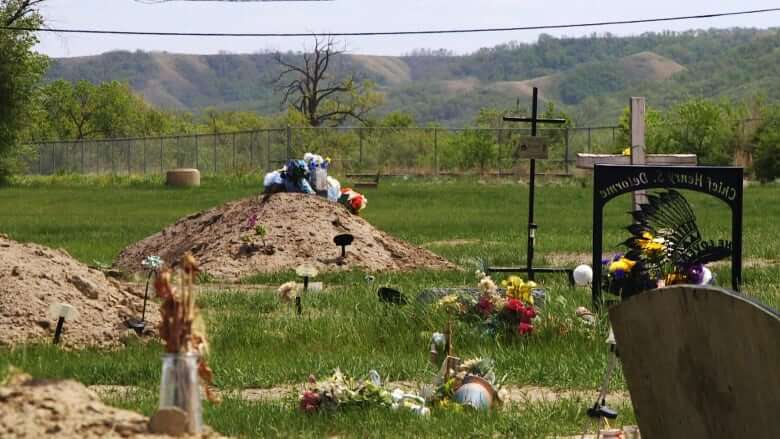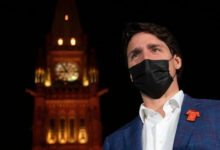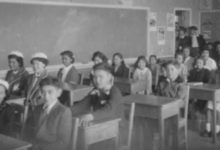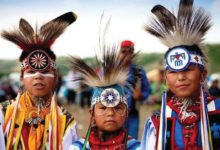Sask. First Nation announces discovery of 751 unmarked graves near former residential school

The Cowessess First Nation announced a preliminary finding Thursday of 751 unmarked graves at a cemetery near the former Marieval Indian Residential School.
Flags on federal buildings lowered in memory of Kamloops residential school victims
The Marieval Indian Residential School operated from 1899 to 1997 in the area where Cowessess is now located, about 140 kilometres east of Regina. Children from First Nations in southeast Saskatchewan and southwestern Manitoba were sent to the school.
The First Nation took over the school’s cemetery from the Catholic Church in the 1970s.
Earlier this month Cowessess started using ground-penetrating radar to locate unmarked graves. It was not immediately clear if all the remains are connected to the residential school.
Cowessess Chief Cadmus Delorme spoke at a virtual news conference Thursday morning.
“This is not a mass grave site. These are unmarked graves,” Delorme said.
Delorme said there may have at one point been markers for the graves. He said the Roman Catholic church, which oversaw the cemetery,may have removed markers at some point in the 1960s.
He said it was not immediately clear if all of the unmarked graves belonged to children, but that there were oral stories within Cowesses First Nation about both children and adults being there.
He said some of the remains discovered may be people who attended the church or were from nearby towns.
Delorme said some 44,000 square metres of area were searched by technical teams from Saskatchewan Polytechnic, which the First Nation partnered with for the search.
Teams were unable to confirm if there were more remains, but said there were 751 “recorded hits” at the site and noted there could be more than one set of remains at each “hit.” He said the penetrating radar work has a 10 to 15 per cent error rate.
Technical teams would be able to provide a verified number in the coming weeks, Delorme said.
Thursday’s announcement marked “Phase 1” of the First Nation’s search efforts, he said. The community would continue search efforts in the area based on oral history.
Last month the Tk’emlúps te Secwépemc First Nation in B.C. announced the discovery of a burial site adjacent to the former Kamloops Indian Residential School that preliminary findings indicate contains the remains of 215 children.
Delorme said the community wants to put names to the people in the graves in the coming months. He said the community would be treating the site “like a crime scene.”
He said he would like to see a monument built at the site that includes the names of those identified.
‘A crime against humanity’: FSIN
Federation of Sovereign Indigenous Nations (FSIN) Chief Bobby Cameron said Thursday that what happened was a “crime against humanity” and that the findings were just the start in terms of finding unmarked graves in Saskatchewan. The FSIN represents Saskatchewan’s First Nations.
“There will be hundreds more unmarked graves and burial sites located across our First Nations land at the sites of former Indian Residential Schools,” Cameron said in a prepared statement.
“There are thousands of families across our Treaty territories that have been waiting for their children to come home. Saskatchewan had the highest number of residential schools and highest number of survivors.”
He said the FSIN would work to get every site in Saskatchewan — schools, sanatoriums and other such locations — searched and victims in those locations identified.
Cameron called on all levels of government to support First Nations efforts in their efforts at those sites.
‘The pope needs to apologize’
Cowessess knowledge keeper Florence Sparvier, 80, attended the Marieval Indian Residential School and shared some of her experiences at the school during the news conference Thursday.
She said she was taken to the school by her parents. At that time, parents who didn’t send their children to school had to spend time in jail, she said.
She said it was “pounded” into students that the cultures they learned at home were wrong.
“They told us what to say. They told us about a new being that was supposed to be our ultimate saviour,” Sparvier said.
“They told us our people, our parents, our grandparents didn’t have a way to be spiritual, because we were all heathens…. We learned how to not like who we were.”
Delorme called for a papal apology.
“The pope needs to apologize,” he said. “An apology is one stage in the healing journey.”
Delorme noted the Canadian government is making some progress on the residential school file and reconciliation efforts, but said “they can move quicker.”
FSIN Chief Cameron said he would like the government of Canada and the churches that ran residential schools to release all records associated to residential schools in the country. He also called for a full, independent and public review into the deaths of First Nations children and people in Canada.
“Our people deserve more than apologies or sympathies, which we are grateful for. Our people deserve justice,” he said.
“Canada can start by handing over all of those records. The churches can start by handing over all of those records.”
Delorme said he’d engaged in discussions with the regional archdiocese of the Roman Catholic Church, who had visited the site a few times.
The regional archdiocese, he said, committed to helping the First Nation achieve its goals, but Delorme said the band hadn’t reached out to anyone higher up in the organization.
Oral history, he said, tells of records being removed from Cowessess in the 1970s and taken to Winnipeg, where they were stored.
“We have full faith that the Roman Catholic Church will release our records,” he said.
“They have not told us no. We just don’t have them yet.”








Redes Sociais - Comentários